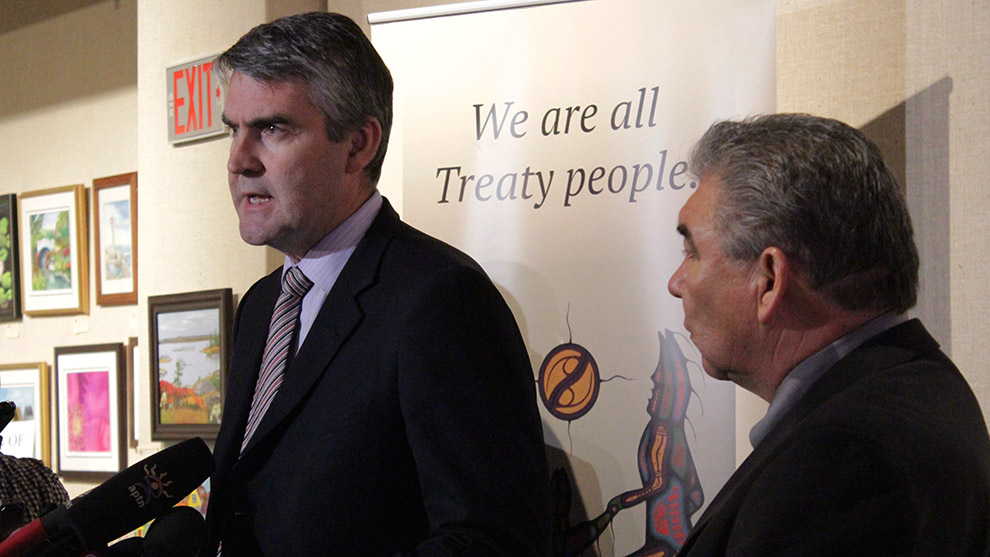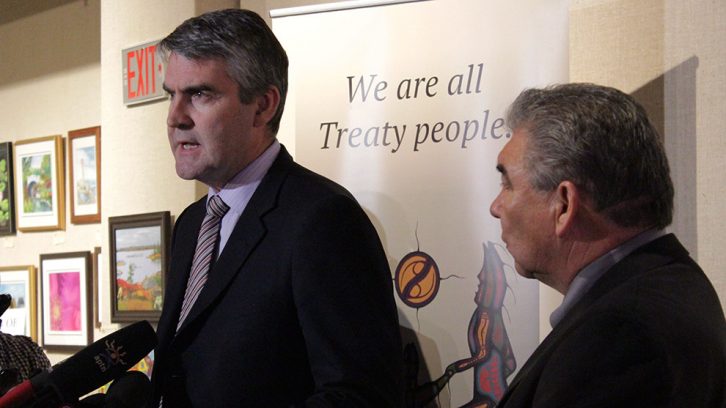First Nations
Mi’kmaq chiefs accept apology for ‘conquered people’ court argument
‘No one in the Mi’kmaq community should’ve had to hear those words’

caption
Premier Stephen McNeil and Glooscap Chief Sidney Peters speak with reporters at the Nova Scotia Archives.
caption
Premier Stephen McNeil and Glooscap Chief Sidney Peters speak with reporters at the Nova Scotia Archives.Nova Scotia Mi’kmaq chiefs say they accept an apology from Premier Stephen McNeil for a government legal brief that referred to Mi’kmaq people as a conquered people.
“After listening to the province and the apology given to us, we understand and we accept,” Membertou Chief Terrance Paul said Thursday, after a meeting between chiefs and the provincial cabinet at the Nova Scotia Archives.
“We feel that it’s a really good start in regards to reconciliation.” Related stories
The legal brief was part of the government’s argument in a court case from last week involving the Sipekne’katik First Nation and its concerns about the Alton Gas project.
On Nov. 14 and 15, the band argued in Nova Scotia Supreme Court that it wasn’t fairly consulted about the project that would store natural gas in salt caverns near the Shubenacadie River. Justice Department lawyer Alex Cameron argued that the government didn’t need to consult the band about the project because government’s consultation obligation only extended to “unconquered people.”
McNeil told reporters he didn’t know about the legal brief until the day before the court case began.
“If I had known that was what would be representing our government, it never would’ve seen the court,” said McNeil. “No one in the Mi’kmaq community should’ve had to hear those words again.”
Justice Minister Diana Whalen also announced Thursday that officials are looking into the brief to find out how it made it to court.
Backlash
There was an immediate backlash to Cameron’s argument when it was presented. Sadie Beaton from the Ecology Action Centre was in court that day and she said the argument caused people to sigh and exchange looks.
“It was jaw dropping,” Beaton said. “He said there is no duty to consult, but they did a good job consulting anyway; I found that a bizarre route to take.”
Afterward, a number of people expressed their outrage through social media. Trish MacIntyre, who opposes the Alton Gas project, wrote an email to McNeil to tell him how shocked she was.
“People are appalled,” MacIntyre said in an interview last Friday. “What more can you do?”
Patricia Doyle-Bedwell, a lawyer and an associate professor at Dalhousie University, said Cameron’s argument is invalid. The treaties of Mi’kmaq people have constitutional protection, which means they have sovereignty as a nation and are, therefore, an unconquered people.
“The idea that the Crown would go and make those arguments in this stage in the game is ridiculous,” Doyle-Bedwell said last Friday. “It’s wrong. The federal government has a duty to consult with Aboriginal people on anything that infringes on their land rights and their constitutionally protected treaty rights.”
Dale Poulette has been protesting the Alton Gas project from the treaty truckhouse along the Shubenacadie River. Truckhouses are outlined in the 1752 Peace and Friendship Treaty as places for Mi’kmaq and settlers to meet and exchange goods.
“We do have treaty rights and we do have sovereignty,” Poulette said Tuesday about the legal brief. “There’s no quitting us.”
Cheryl Maloney is a member of the Sipekne’katik band and lives in Shubenacadie. After hearing that the chiefs accepted McNeil’s apology, she said in a Facebook post that it should have been directed to the Mi’kmaq people in Shubenacadie, not just the Mi’kmaq chiefs.
Withdraw argument: NDP
The NDP have called on the provincial government to withdraw the legal brief from the case. NDP Leader Gary Burrill said an apology is not enough.
“This regret rings hollow unless the offending arguments are withdrawn,” Burrill said in a media release Thursday.
In response, McNeil said he wasn’t sure if that was possible. Regardless, he added, the court case was about whether or not the government met its obligation to consult the Sipekne’katik band, nothing more.
“Our position during that court case is that we have a duty to consult,” McNeil told reporters. “We felt we met that obligation in this project, but others did not … it wasn’t about anything else.”

